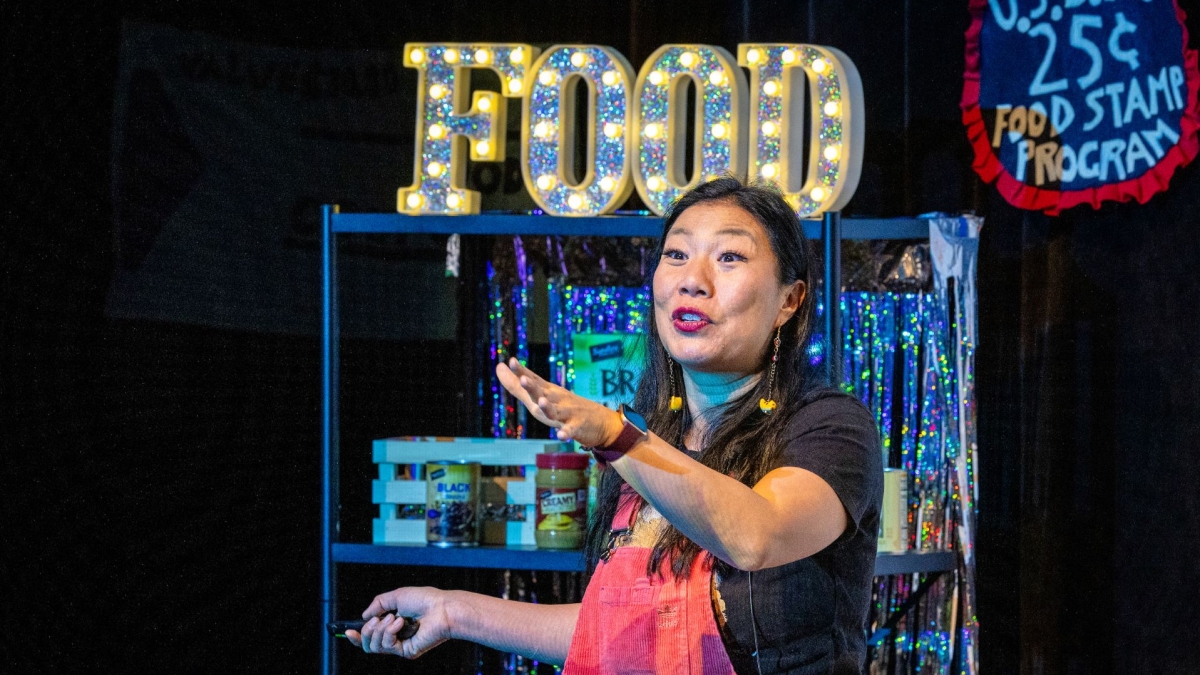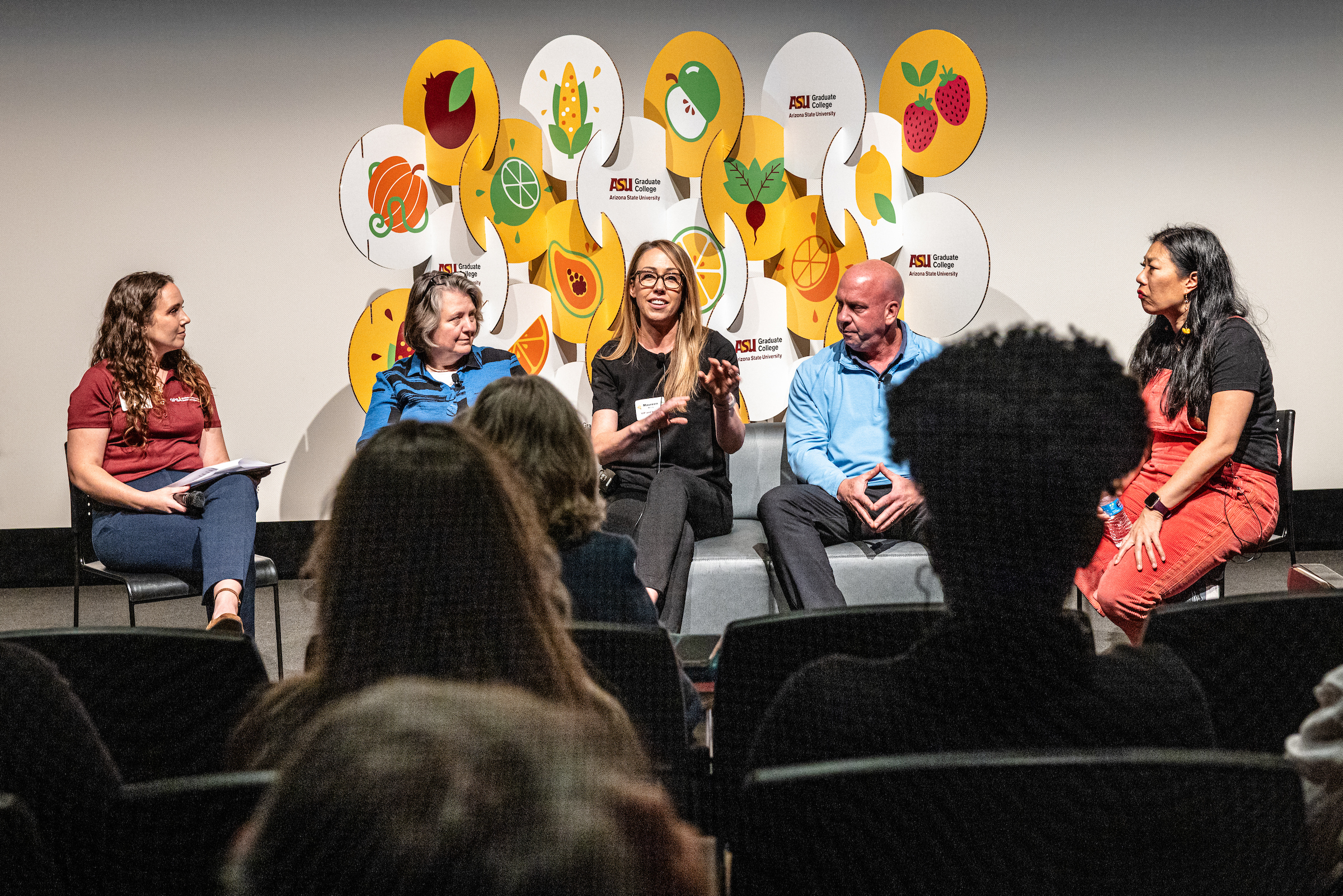Comedian Kristina Wong draws laughs as 'food bank influencer'

Kristina Wong, comedian, actor and artist-in-residence at ASU Gammage, performs her show "Sex, Lies, and Food Banks: Reimagining the Future of Emergency Food," as the keynote speaker of the ASU Graduate College Distinguished Lecture on Friday, Nov. 3, at the Marston Exploration Theater on the Tempe campus. Photo by Charlie Leight/ASU News
Editor’s note: This story is featured in the 2023 year in review.
Are food banks sexy?
Kristina Wong said she’s intent on proving they are for a show she’s creating on food insecurity.
“I’m here insisting on bringing the sex appeal back to food banks,” said Wong, a comedian, actress, writer and the current ASU Gammage artist-in-residence.
Wong was the keynote speaker at the ASU Graduate College Distinguished Lecture on Friday. Her show, “Sex, Lies, and Food Banks: Reimagining the Future of Emergency Food,” was a humorous take on the magnitude of the food-insecurity problem and her advocacy for an innovative food bank in Los Angeles.
“There’s no precedent for a drama about food banks,” she said before launching into one of several parody songs, this one to the tune of “Welcome to the Jungle”:
“Welcome to the food bank/ We got groceries!/ If you got no money honey/ We take EBT!”
Wong, who said she hopes to debut the final version of her show in 2025, described the difference between hunger and food insecurity:
“We’ve all been hungry for dinner, but food insecurity is this long-range condition where you have done things like skip a meal or eat cheaper food because you don’t have access to foods that are culturally or nutritionally appropriate or for you,” she said.
Using humor to make her point, Wong asked the audience to reveal the things they’ve done to get a free meal when they were food insecure and they answered: attending on-campus events, going on boring dates, volunteering to pack boxes at a food bank in exchange for a hot meal and going to a church you don’t believe in.
Wong, who qualified for food stamps when she was in her 20s but never applied, said that even now, she’ll forego healthier food options because they feel too expensive.
One day, Wong, who lives in Los Angeles, wandered into the World Harvest Food Bank, which is set up like a grocery store. Anyone can come in and fill up two grocery carts for $40.
“I was so enamored of this system and how much dignity there was in being able to pick the food you want. This food bank doesn’t ask for proof of income. It doesn’t feel humiliating. There’s a lot of Asian groceries,” she said.
“I said, ‘I’m going to be the world’s first food bank influencer. I’m going to pump this food bank up!’”
So she made a series of YouTube videos showing what she got for $40. Then the LAist online magazine did a story on the food bank and she was asked to become an influencer for Calfresh, the state’s food stamp system.
Wong said that food banks started as a short-term solution to a crisis but are now such an accepted part of life that volunteering at one has become the default charity gesture.
She also discussed food waste in a parody song to the tune of “Hit Me Baby One More Time”:
“Oh thrown-out can, how was I supposed know/ That you’re still good to eat?/ Oh day-old bagel, I shouldn’t have let you go,/ Now you can’t get my bite.”
Megan McCaughan (left), president of the Graduate and Professional Student Association, moderated a panel of food experts at the ASU Graduate College Distinguished Lecture on Friday. They are, starting from second from left: Kathleen Merrigan, executive director of the Swette Center for Sustainable Food Systems at ASU; Maureen McCoy, associate teaching professor in the College of Health Solutions and faculty advisor to the Pitchfork Pantry; Steve Short, owner of Atlasta Catering; and comedian Kristina Wong. Photo by Charlie Leight/ASU News
After her show, Wong sat on a panel with other food-insecurity experts and answered questions that had been sent in by audience members earlier. Some highlights:
Kathleen Merrigan, former U.S. Deputy Secretary of Agriculture and executive director of the Swette Center for Sustainable Food Systems at ASU:
Merrigan said that using humor, like Wong, is an important way to approach the topic.
“It’s hard to talk about these issues. ‘Oh there she is again, Kathleen ruining the dinner party.’
“We need to bring more people to the conversation and to use humor and the arts to make people say, ‘Yes I want to have that conversation.’”
Merrigan discussed how pantries are trying to improve the quality of food they provide.
“In Washington, D.C., they don’t accept any more sheet cakes from grocery stores,” she said. “More food banks are purchasing food to get the fresh produce they want their clients to have.”
During the pandemic, the federal government eased the rules for college students to access SNAP benefits. The current Farm Bill, now being negotiated, contains a provision to makes those rules permanent.
“There’s a misunderstanding among members on both sides,” she said. “They think all students live in dorms with Mom and Dad paying tuition. I have had single moms with four kids and I’ve had students who were homeless. If those legislators could meet these students, they would see what lengths they go to to get that degree that could change their lives.”
Maureen McCoy, associate teaching professor in the College of Health Solutions and the faculty advisor for the Pitchfork Pantry:
“We’ve normalized the ‘starving college student’ mentality,” she said.
“'I starved as a student, therefore you must starve too. You can live off noodles.’"
McCoy said that applying for SNAP benefits is confusing and students in the Watts College of Public Service and Community Solutions go through training to sit in the Pitchfork Pantry and help their peers apply.
The Pitchfork Pantry started as a student-run club in 2017 and now serves 2,000 students a month at the four campuses. The pantry is entirely self-funded, is a nonprofit under the ASU Foundation and works with all the major food banks in the Valley as well as “rescuing” groceries from Trader Joe’s.
“Relying on the outside food pantries won’t give you what you need. For our larger events, we need 300 cartons of yogurt and 300 heads of lettuce,” McCoy said. “We do purchase a fair amount of food.”
Many students lack transportation, so last year the pantry got a grant to work with DoorDash for free delivery within a 10-mile radius. The pantry also uses the little delivery robots on campus for a $2 fee because delivery is an important issue.
“If you walk past our pantry and see a line of 300 students, it’s intimidating to get into that line,” she said.
Steve Short, owner of Atlasta Catering, which is committed to sustainability:
Short said that the issue of food waste is logistical.
“Restaurants aren’t the answer. Any restaurant that has extra food won’t be around for long,” he said.
“It’s hotels, catering, civic centers, event centers. It’s the participation of chefs and cooks after the events and the energy it takes to package this. There are business models to get kitchens to package (excess food) and get it out, but it’s all a logistical problem,” he said.
Short said his business’ zero-waste policy requires commitment.
“I’m not curing food insecurity. I’m curing food going into a landfill,” he said.
Wong said that the solution needs to be wide-ranging.
“It’s about advocacy and approaching food insecurity not just by throwing food at it. It’s holistic. The food banks should be mobilizing their client base to make calls to Congress to advocate for a higher minimum wage.”
Wong will appear with globally recognized chef and Nobel Peace Prize nominee José Andrés at the 2023 Celebration for Resilience to honor this year’s Resilience Fellows on Wednesday, Nov. 8, at ASU Gammage. Tickets are $25.
More Environment and sustainability

ASU researchers test environmental risks of tire emissions on Arizona highways
The Greater Phoenix area’s roadway grid system is the envy of urban planners everywhere, and the Arizona Department of Transportation, or ADOT, strives for…

A 6-month road repair that only takes 10 days, at a fraction of the cost? It's reality, thanks to ASU concrete research
While Arizona’s infrastructure may be younger than its East Coast counterparts, the effects of aging in a desert climate have begun to take a toll on its roads, bridges and railways. Repairs and…

Mapping DNA of over 1 million species could lead to new medicines, other solutions to human problems
Valuable secrets await discovery in the DNA of Earth’s millions of species, most of them only sketchily understood. Waiting to be revealed in the diversity of life’s genetic material are targets for…


